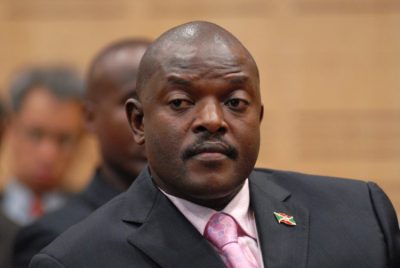By
Sylvain Muyali
Belgian journalist Colette Braeckman, in a recent article provided her analysis on the current situation with Burundian President Pierre Nkurunziza’s current insistence of running for a third term.
Despite this being ruled as illegal by most, Braeckman states that the President still has the outside support of the Rwandan Hutu FDLR rebel group, elements of the Congolese police force and especially Tanzania, which allowed him to return to his country after announcing the coup of failed Gen. Godefroid Niyombare.
Since then however, the major countries of the international community appear not to appreciate the scope of the Burundian President Nkurunziza against democracy that had such an effect throughout different social classes in Burundi.
France, which had long held a prudent reserve is also joining Belgium and the Netherlands in deciding to suspend cooperation in the field of security.
Despite such warnings, a substantial budget was still made available for the election, the next in Burundi coming as no surprise, with the opposition announcing its intention to boycott, a prospect that does not seem to affect the authorities.
Several official statements, including a briefing note provided to African heads of state, denounced the “prejudices” and “preconceived ideas” that “distort the judgment of the many special envoys and other delegations who travel to Bujumbura” and including “recommendations (that) are not nourished by the facts observed on the ground.”
Official documents also ensure that the candidacy of the President for a third term is not negotiable. For its part, the opposition said the exact same thing, but … the other way, making the erasure of Nkurunziza an absolute prerequisite.
Obviously if the neighboring countries of Burundi decided to apply to the president the same treatment as that inflicted in 1996 to Pierre Buyoya, who faced a relentless embargo following a coup attempt, the regime would be forced to make concessions.
Nothing is certain however. Indeed, during the failed coup, everyone noticed that if Tanzania had endorsed the President’s overthrow, he could never return to his country. Now it is Tanzanian President Kikwete himself who brought his colleague to the border.
Moreover, there is a subtle game between the nations of Burundi, Congo and Rwanda. In Bujumbura, the demonstrators assure, albeit without providing evidence, that Interahamwe (Rwandan Hutu rebels still encrusted in Congo) have crossed the border to strengthen Imbonerakure (the youth wing).
It has also unofficially been reported that Congolese soldiers and policemen dispatched from Goma, have crossed Lake Kivu to assist their colleagues in Burundi, but to date no one has been able to provide confirmation of this.
In Bukavu, Congolese officials describe relations between the two countries in cautious terms: “Congo is not actively supporting Nkurunziza, but will not let go either.”
In fact, no one in the region has forgotten that in November 2013, during the offensive of the Congolese forces (FARDC) against M23 Tutsi rebels, backed by Kigali, Tanzanian and South African forces, intended to form the “African Standby Brigade” operating under the banner of the UN, were allowed to pass through the airport in Bujumbura, much to Kigali’s great displeasure, this apparent lack of solidarity of the “little brother” Burundi not forgiven by them.
This joint effort, supported by the African Standby Brigade, had led to the defeat of the M23 Movement, an ally of Kigali. Since then, relations between Tanzania and Rwanda have been very bad. The situation between South Africa and Kigali has hardly warmed, the current debates on Burundi hiding many thoughts of the past.
More importantly, since the Rwandan infiltrations have been reported in North Kivu, the cycle of mutual accusations has resumed. Thus, a Congolese officer in a supporting document said that, on April 7th he handed over a member of the FDLR rebels who wanted to return to his own country to the UN peacekeeping mission in the Congo, MONUSCO. To his surprise, on the 13th of the same month, he found that the man who had been sent back was operating again in the Congo.
While regional summits develop around the crisis in Burundi, with its procession of refugees and natural concern to all international neighbors, it is far from a unanimous and sincere position.



No Comments Yet!
You can be first to comment this post!